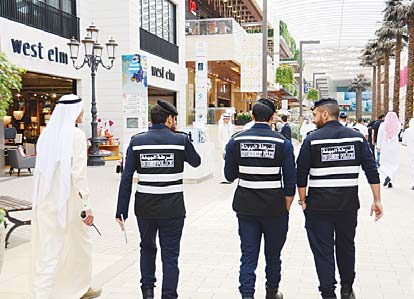08/11/2015
08/11/2015
 KEP inspection tour.
KEP inspection tour.KUWAIT CITY, Nov 7, (KUNA): The State of Kuwait, adopting international laws and principles on the environment protection, has taken a chain of steps at this level, latest of which was establishment of the Kuwait Environmental Police (KEP). The KEP has been established in line with guidelines by His Highness the Amir Sheikh Sabah Al-Ahmad Al- Jaber Al-Sabah, Kuwait’s top advocate of humanitarian principles and security — whose efforts in these domains have earned him the UNdesignated title, the “Humanitarian Leader,” coupled with another equalcaliber gesture on part of the international organization, dubbing the State of Kuwait, the “Humanitarian Center.” On basis of His Highness the Amir’s instructions, the National Assembly (Parliament) has enacted Law 42/2014, modified with the Law 99/2015, stipulating formation of the KEP and setting its tasks in the provisions, 113, 114 and 115, said Lieutenant Colonel Hussein Mohammad Al-Ajmi, the KEP Chief, in an exclusive interview with Kuwait News Agency (KUNA).
Laws
He also lauded, in this respect, efforts of the Undersecretary, Lieut Gen Sulaiman Al-Fahad and the chief of the special commission tasked of setting regulations for establishment of the KEP department, the Assistant Undersecretary for Public Security, Major General Abdulfattah Al-Ali. Lieut Col Al-Ajmi, who has a Master’s degree in environmental sciences, revealed that the Ministry of Interior has mapped out an executive plan for launching media campaigns and educating the public about necessary role of the new force, with respect of protecting the environment as well as ensuring sustainable development and bolstering environmental security.
The squad has already staged patrols at shopping malls, fair grounds, Kuwait International Airport, hospitals and ministries, monitoring any violations against sound and clean surrounding, such as littering or smoking.
Tickets have been issued against smokers at some malls, where special enclosures for smokers are available. Elaborating, Lieut Col Al-Ajmi said the ministry is cooperating with the UN Development Programme, seeking guidance on regulating the newly-born department, in addition to cooperation with the Interpol for expertise exchange in this field, namely identification of environmental crimes and penalties.
The KEP command will take part, later this month, in a conference at officers’ level, due in the French city Nimes, for examining other states’ experience in combating environmental offenses and establishing cooperation in the sector. Lieut Col Al-Ajmi indicated that the squad cooperates with the Environment Public Authority (EPA), noting that several cases, classified as both felonies and crimes, have been referred to the Public Prosecution. Shedding some light on offenses, categorized as part of the KEP tasks, he mentioned fishing in the Kuwait Bay, dropping waste randomly, scooping up soil particularly at the camping locations or another harmful action in the desert that may harm the wild life. Lieut Col Al-Ajmi urged citizens and residents to report about any detrimental acts against the Kuwaiti environment, via the MoI operations room phone number, 112.
For his part, Khaled Mardhi Al- Enezi, EPAPublic Relations Director, affirmed the necessary role of the KEP in clamping down on environment violations, “with the power of the law.” The force also helps the authority during inspection tours to plants, factories, natural reserves, ports and beaches. The KEP and EPA perform in an integrated manner, where the squad takes charge of the security matters, while the authority handles technical issues, he said, noting that penalties and fines imposed on the offenders are not intended to make financial proceeds; but to inject awareness among such persons of who do inconsiderate acts that leave damage on the surroundings and the environment.
Fines


